Muhsin Al-Ramli's Blog, page 2
November 16, 2022
Literatura iraquí / Elige libro
Los jardines del presidente
Es una historia de muerte, amor y amistad
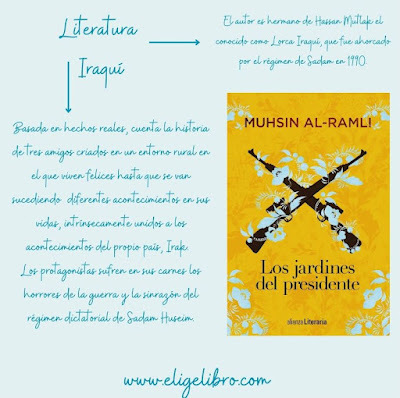
por: Nagore Pérez
Podría decir que esta novela me ha sacado de «mi zona de confort lectora» no solo por diferente sino porque impele a la reflexión, me ha enseñado mucho sobre Irak, sobre sus gentes y costumbres y además es bastante entretenida, dentro de la extrema dureza de sus páginas.
El libro es una sucesión de momentos amargos y crudos y no es para menos teniendo en cuenta que recorre la historia de Irak en sus últimos cincuenta años. Cincuenta años repletos de cruentas guerras, empezando por la guerra con Irán, pasando por la guerra del golfo tras la invasión de Kuwait, hasta la invasión de Irak por parte de una alianza de naciones encabezada por Estados Unidos.
La historia se cuenta desde el prisma de tres inseparables amigos de la infancia Tarek, Abdulá Kafka e Ibrahim, criados en un entorno rural en el que viven felices hasta que se van sucediendo los diferentes acontecimientos en sus vidas, intrínsecamente unidos a los acontecimientos del propio país. Uno de ellos sufre las torturas de la república islámica de Irán, otro será mutilado en la guerra de Kuwait… en definitiva los protagonistas sufren en sus carnes los horrores de la guerra y la sinrazón del régimen dictatorial de Sadam Husein.
La novela termina en 2006, tras el derrocamiento de Sadam, y pareciera que al cerrar la última página se cerrara la historia de horror de Irak. Sin embargo, nunca fue así, la calma y la paz no consiguen posarse en Irak, menos ahora que ha aparecido en escena el Estado Islámico y después de acabar con la vida de miles de civiles tiene aterrorizados a los iraquíes (entre otros).
El autor Muhsin Al-Ramli @alramlimuhsin, merece una mención para aquellos que como en mi caso no lo conozcáis. Se trata de uno de los más prestigiosos escritores de Irak, aunque lleva años residiendo en Madrid. Nadie mejor que él, exiliado del país y perseguido por el régimen puede apuntalar la historia que cuenta. Su hermano, Hassan Mutlak (el conocido como Lorca Iraquí) fue ahorcado por el régimen de Sadam en 1990.
Es una historia difícil, pero merece la pena leerla, no es solo una historia de muerte, es sobre todo una historia de amor y de amistad.
https://www.instagram.com/p/ClB-QYmtqS4/?hl=es
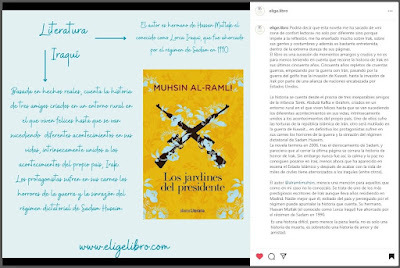
November 12, 2022
Iraqi Book Club/ The President's Gardens: Muhsin Al-Ramli
Iraqi Book Club The President's Gardens : Muhsin Al-Ramli
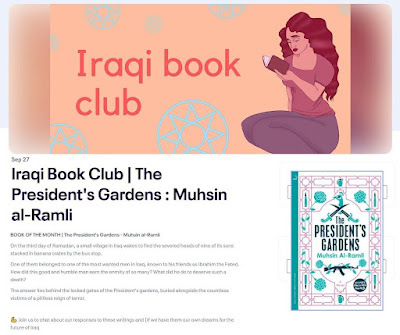
Together, we share our stories about Iraq and meet new people in a supportive environment. We do this by talking about books.
About this event
We are a community group of people who have a relationship with Iraq. Some of us were born there, some of our parents were born there, some have lived and worked there and some are just curious.
Together, we aim to share our stories about Iraq and meet new people in a supportive environment. We do this by talking about books.
We talk about books written by Iraqi authors, both non-fiction and fiction. We like to read traditionally minority voices, like those of women, religious minorities and people who are queer. We do this so we can get the full picture of what it means to live in 🇮🇶 Iraq.
We meet every other month online to learn and get to know new people. Every so often we have a get-together in person somewhere in the UK. All sessions are appropriate for anyone with an open mind and heart, of any ethnicity and background!
____
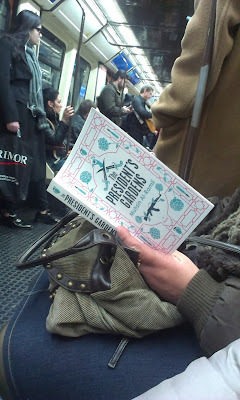
BOOK OF THE MONTH | The President's Gardens - Muhsin Al-Ramli
On the third day of Ramadan, a small village in Iraq wakes to find the severed heads of nine of its sons stacked in banana crates by the bus stop.
One of them belonged to one of the most wanted men in Iraq, known to his friends as Ibrahim the Fated. How did this good and humble man earn the enmity of so many? What did he do to deserve such a death?
The answer lies behind the locked gates of The President's gardens, buried alongside the countless victims of a pitiless reign of terror.
Join us to chat about our responses to these writings and (if we have them our own dreams for the future of Iraq
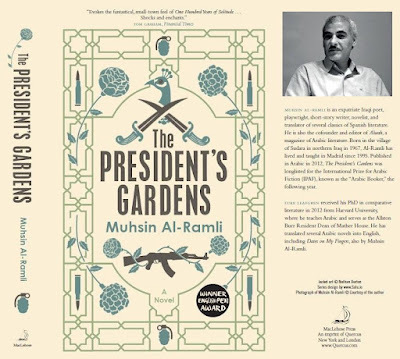
September 20, 2022
Entrevista, Muhsin Al-Ramli, Radio Casa Bukowski
حوار مع #محسن_الرملي بالإسبانية
في راديو دار بوكوفسكي
Entrevista con Muhsin Al-Ramli,
en Radio Casa Bukowski,
el programa DESDE EL OTRO LADO DEL MAR!
Por: Cristina Penalva
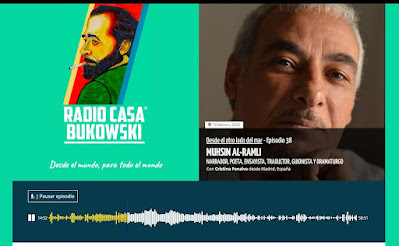
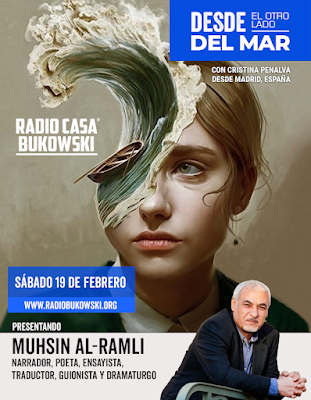
#Poesia #Bukowski #MuhsinAlRamli
May 27, 2022
Islamic Azad University of KermanshahFaculty of Literatu...
Islamic Azad University of Kermanshah
Faculty of Literature and Humanities
Thesis for obtaining a master's degree
Arabic literature
النقد الثقافي في روايات محسن الرملي
Title:
Cultural Criticism in MuhsinAl-Ramli's Novels
Writer:
Mohammed Majid EbraheemAlkhazali
Supervisor:
Dr. Jafar Firoozmandi

Cultural criticism isone of the most important literary phenomena that was associated withpostmodernism in the field of literature and criticism. This reaction was inresponse to linguistic structuralism، semiotics، and aesthetic theory، which on the one hand relates to literature as a formallinguistic phenomenon.، Or an artistic and aesthetic phenomenon on the other hand areall subject to criticism because they are a narrative system that must beexposed to this criticism and cultural criticism deprives the text of itsaesthetic and visual content as well as its exaggerations. Extremely formalexcesses، and placing them in the monetary base to achieve the realperspective of the text، and precisely related to the study and study of implicitcultural patterns in its cultural، social، political، historical and religious context،understanding، It is interpreted and analyzed. In this dissertation، we tryto focus on cultural criticism in the novels of Dr. (Muhsin Al-Ramli)، MuhsinAl-Ramli، which is the product of the tragedy of a country that ispolitically، socially and Muhsin Al-Ramli on the tragic consequences of thisruling authority such as dissolution، corruption Corruption is one of the most important causes ofthese pressures، authoritarianism and unjust authority that led to thedestruction of the people. And betrayal of all core values and others has createdimplicit patterns and apparent problems. These patterns are highlighted in hisnovels، which were the title of my letter in which I addressed MuhsinAl-Ramli's cultural critique of social and political aspects. And the religiousaspect، which did not stop only by criticizing the past، but alsocontinued to criticize the present. It is an era of occupation that also showednegative cases، some of which are negative thoughts and cases، some ofwhich are social، some of which are political and some of which are religious، and someof which have tried to destroy the country in the illusion of politics orreforming society. Images that identify the main themes of two different livesbelong to one person. One of them was formed based on the events of immigration، theinjustice of the authorities and the love for his country، andpassion still lives in him.
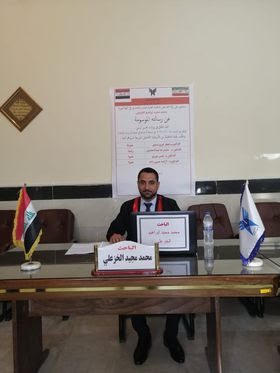
Islamic Azad University of Kermanshah Faculty of Literat...
Islamic Azad University of Kermanshah
Faculty of Literature and Humanities
Thesis for obtaining a master's degree
Arabic literature
النقد الثقافي في روايات محسن الرملي
Title:
Cultural Criticism in Muhsin Al-Ramli's Novels
Writer:
Mohammed Majid Ebraheem Alkhazali
Supervisor:
Dr. Jafar Firoozmandi

Cultural criticism is one of the most important literary phenomena that was associated with postmodernism in the field of literature and criticism. This reaction was in response to linguistic structuralism، semiotics، and aesthetic theory، which on the one hand relates to literature as a formal linguistic phenomenon.، Or an artistic and aesthetic phenomenon on the other hand are all subject to criticism because they are a narrative system that must be exposed to this criticism and cultural criticism deprives the text of its aesthetic and visual content as well as its exaggerations. Extremely formal excesses، and placing them in the monetary base to achieve the real perspective of the text، and precisely related to the study and study of implicit cultural patterns in its cultural، social، political، historical and religious context،understanding، It is interpreted and analyzed. In this dissertation، we try to focus on cultural criticism in the novels of Dr. (Muhsin Al-Ramli)، Muhsin Al-Ramli، which is the product of the tragedy of a country that is politically، socially and Muhsin Al-Ramli on the tragic consequences of this ruling authority such as dissolution، corruption Corruption is one of the most important causes of these pressures، authoritarianism and unjust authority that led to the destruction of the people. And betrayal of all core values and others has created implicit patterns and apparent problems. These patterns are highlighted in his novels، which were the title of my letter in which I addressed Muhsin Al-Ramli's cultural critique of social and political aspects. And the religious aspect، which did not stop only by criticizing the past، but also continued to criticize the present. It is an era of occupation that also showed negative cases، some of which are negative thoughts and cases، some of which are social، some of which are political and some of which are religious، and some of which have tried to destroy the country in the illusion of politics or reforming society. Images that identify the main themes of two different lives belong to one person. One of them was formed based on the events of immigration، the injustice of the authorities and the love for his country، and passion still lives in him.

April 5, 2022
Un caf�� literario con el Dr. Muhsin Al-Ramli. Maletas de Cart��n
Un caf�� literario con el Dr. Muhsin Al-Ramli
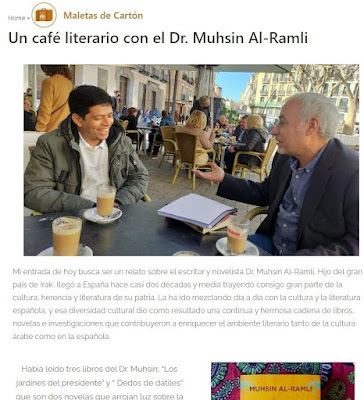
Por: YousefAl-Dubai
Mi entrada de hoy busca ser un relatosobre el escritor y novelista Dr. Muhsin Al-Ramli. Hijo del gran pa��s de Irak,lleg�� a Espa��a hace casi dos d��cadas y media trayendo consigo gran parte de lacultura, herencia y literatura de su patria. La ha ido mezclando d��a a d��a conla cultura y la literatura espa��ola, y esa diversidad cultural dio comoresultado una continua y hermosa cadena de libros, novelas e investigacionesque contribuyeron a enriquecer el ambiente literario tanto de la cultura ��rabecomo en la espa��ola.
Hab��a le��do tres libros del Dr. Muhsin;���Los jardines del presidente��� y ���Dedos de d��tiles��� que son dosnovelas que arrojan luz sobre la historia contempor��nea de Irak, y reflejan lascostumbres, tradiciones y la vida social y pol��tica de ese antiguo pa��s. Elotro libro es: ���La Literatura Espa��ola en su Siglo de Oro��� que es unestudio cr��tico, hist��rico y cultural, que hace un seguimiento de lastransformaciones acaecidas en la literatura espa��ola en los siglos XVI yXVII.
El libro contienetambi��n cincuenta cuentos de catorce escritores espa��oles del siglo de oro,adem��s de una antolog��a de m��s de cien poemas y tres breves modelos teatralesdel escritor espa��ol m��s relevante: ���Miguel de Cervantes���.
Lo que despert��m��s mi inter��s fueron las nuevas ideas que el Dr. Muhsin trajo en su tesis,porque eran ��nicas, nuevas y atrevidas al mismo tiempo. Porque trataban un temamuy emocionante e interesante, que nadie hab��a tocado antes: ���El impacto dela cultura ��rabe e isl��mica en Don Quijote���. Siendo una de las m��simportantes novelas escritas en espa��ol, que ha sido objeto de decenas de milesde investigaciones y estudios en los ��ltimos cuatro siglos, el Dr. Muhsindecidi�� enriquecer el tema y a��adir enfoques apasionantes en la vida deCervantes y su influencia en la cultura ��rabe e isl��mica, as�� como el reflejode esa influencia en Don Quijote.
El Dr. Muhsin esuna persona fuerte y hecha a s�� misma, que fue testigo de muchos eventospol��ticos en Irak. Ha sido amenazado y hostigado en varias ocasiones,especialmente despu��s del intento de golpe de estado contra el r��gimen en Iraken el que perdi�� a su hermano mayor. Debido a todos estos acontecimientos, huy��a Jordania en 1991 y trabaj�� all�� como periodista y traductor. Luego tuvo laoportunidad de ser aceptado en la Universidad de Madrid, por lo que vino aEspa��a en el a��o 1995.
A pesar de lasmuchas dificultades y duras condiciones que obligaron al Dr. Muhsin aenfrentarse a muchos retos tras su llegada a Madrid, con valent��a no sedesesper�� y continu�� su carrera acad��mica, narrativa y literaria. Como ��l dice:���Cada ma��ana es un regalo precioso que debemos aprovechar y disfrutarplenamente���.
El Dr. Muhsin es escritor, poeta,traductor y acad��mico. Escribe tanto en ��rabe como en espa��ol. Obtuvo sudoctorado, con matr��cula de honor, en la Facultad de Filosof��a de laUniversidad Aut��noma de Madrid por su tesis ya mencionada (El impacto dela cultura isl��mica en el Quijote) en 2003.
Algunos de suslibros y textos han sido traducidos a multitud de idiomas como espa��ol, ingl��s,franc��s, italiano, alem��n, portugu��s, turco, ruso, catal��n, alban��s, finland��sy kurdo.
Tambi��n haimpartido muchas conferencias y participado en muchos seminarios, veladas,conferencias y ferias del libro en Irak, Jordania, Marruecos, Espa��a, Portugal,Kuwait, Luxemburgo, Qatar, Colombia, Argelia, Libia, M��xico, Costa Rica y losEmiratos ��rabes Unidos. Actualmente es profesor en la UniversidadAmericana de Saint Louis en Madrid, y reside en Espa��a.
Nuestro encuentrofue en el centro de la capital, Madrid, concretamente en Tirso de Molina. Creoque fue un lindo gesto del Dr. Muhsin, ya que sugiri�� el lugar de encuentro enel centro de Madrid y eligi�� un caf�� que se llama ���Galicia���, que es la regi��nde donde ��l pensaba que yo ven��a. Cerca de esa plaza est�� el mercado popular delos domingos, ���El Rastro���, cuyos puestos y sonidos de los vendedores merecordaron a Bagdad, Damasco, El Cairo, Marrakech y otras ciudades ��rabes,donde abundan los mercados populares.
Con una caraalegre y una gran sonrisa, el Dr. Muhsin nos salud�� y me salud��, ��con unhermoso acento iraqu��!
���Hola,yousef!.
��C��moest��s?���
Despu��s deintercambiar saludos, empezamos a charlar y pasamos a tratar muchos temasculturales, literarios e hist��ricos. Hablamos de Yemen y la antigua relaci��n deeste con el subcontinente ib��rico. Tambi��n de Zaragoza, donde la mayor��a de lossus antiguos residentes ��rabes eran yemen��es (algunas familias a��n se mantienenall��, con el t��tulo yemen�� hasta el d��a de hoy), adem��s de la presencia dealgunos edificios con ventanas ennegrecidas, puertas y techos con yeso blanco alestilo de la arquitectura yemen��.
Pasamos a hablarde su tesis doctoral, que despert�� mucho inter��s en los c��rculos literarios delmundo ��rabe. Me habl�� de la dificultad de traducir la poes��a ��rabe cl��sica alespa��ol y otras lenguas, por las dimensiones hist��ricas y culturales quepermean la poes��a, as�� como y las estructuras y formas ling����sticas propia dela lengua materna.
Empezamos adiscutir sobre muchos temas culturales, literarios y pol��ticos, y esto nosllev�� de nuevo a hablar del libro ���Cuando ��ramos ��rabes��� de Emilio Gonz��lezFerr��n, que habla de la historia de musulmanes y ��rabes en el subcontinenteib��rico. En opini��n del Dr. Muhsin, es un muy buen libro porque se mueve muchodel relato predominante en torno a la historia de la Pen��nsula Ib��rica.
Hablar con el Dr.Muhsin no aburre, tiene un gran conocimiento y un hermoso estilo de narraci��n,te da una imagen clara y completa del tema de conversaci��n en frases cortas quereflejan su vasta cultura y su gran conocimiento de varios temas. Aunque est��lejos del Medio Oriente en cuerpo, siempre est�� conectado a ��l. Sigue susnoticias y busca a tientas su inquietudes y problemas.
Este encuentro conel Dr. Muhsin fue el primer encuentro en la capital, Madrid, con el que eldestino nos uni��. Pero sent�� que entre ��l y yo hab��a una relaci��n que seextiende por a��os, conoc�� su car��cter a trav��s de sus libros desde el primermomento que cayeron en mis manos.
Nuestra reuni��ntermin�� con la esperanza de que se repetir�� lo antes posible, y el Dr. Muhsinme entreg�� una copia en ��rabe de su novela ���Bint Tigris���; La hija delTigris.
Por tanto, ahorahe agregado un nuevo libro a mi biblioteca firmado por su autor. Seguir��navegando y leyendo en su mundo lleno de emoci��n y belleza.
Lo m��s lindo de ese d��a fue que ��ramos cuatro personas dediferentes pa��ses; el Dr. Muhsin es de Irak, yo soy de Yemen, la se��oritaSilvia es de Italia y el amigo Diego es de Per��. Venimos de diferentesambientes, diferentes culturas, y diferentes costumbres y tradiciones, perotenemos en com��n la literatura, los libros nos unieron. Y eso es lo que buscopor donde voy, las cosas que unen, las cosas en com��n que tenemos. ��Son muchascosas hermosas!
----------------------------------------------------------------
*Publicado en: Maletas de Cart��n, enmarzo 2022 Madrid
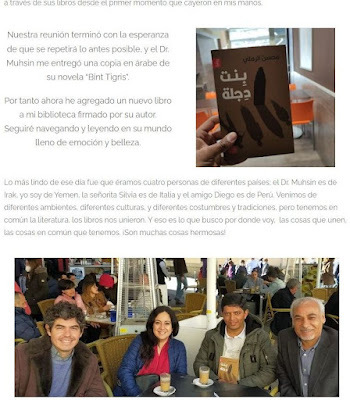
https://maletasdecarton.org/un-cafe-literario-con-el-dr-muhsin-al-ramli/
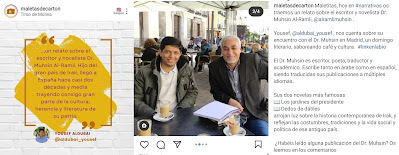
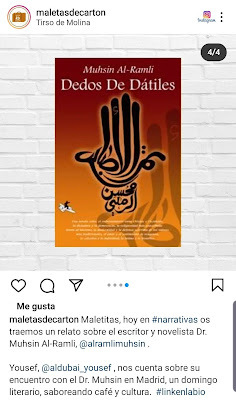
Un café literario con el Dr. Muhsin Al-Ramli. Maletas de Cartón
Un café literario con el Dr. Muhsin Al-Ramli

Por: Yousef Al-Dubai
Mi entrada de hoy busca ser un relato sobre el escritor y novelista Dr. Muhsin Al-Ramli. Hijo del gran país de Irak, llegó a España hace casi dos décadas y media trayendo consigo gran parte de la cultura, herencia y literatura de su patria. La ha ido mezclando día a día con la cultura y la literatura española, y esa diversidad cultural dio como resultado una continua y hermosa cadena de libros, novelas e investigaciones que contribuyeron a enriquecer el ambiente literario tanto de la cultura árabe como en la española.
Había leído tres libros del Dr. Muhsin; “Los jardines del presidente” y “Dedos de dátiles” que son dos novelas que arrojan luz sobre la historia contemporánea de Irak, y reflejan las costumbres, tradiciones y la vida social y política de ese antiguo país. El otro libro es: “La Literatura Española en su Siglo de Oro” que es un estudio crítico, histórico y cultural, que hace un seguimiento de las transformaciones acaecidas en la literatura española en los siglos XVI y XVII.
El libro contiene también cincuenta cuentos de catorce escritores españoles del siglo de oro, además de una antología de más de cien poemas y tres breves modelos teatrales del escritor español más relevante: “Miguel de Cervantes”.
Lo que despertó más mi interés fueron las nuevas ideas que el Dr. Muhsin trajo en su tesis, porque eran únicas, nuevas y atrevidas al mismo tiempo. Porque trataban un tema muy emocionante e interesante, que nadie había tocado antes: “El impacto de la cultura árabe e islámica en Don Quijote”. Siendo una de las más importantes novelas escritas en español, que ha sido objeto de decenas de miles de investigaciones y estudios en los últimos cuatro siglos, el Dr. Muhsin decidió enriquecer el tema y añadir enfoques apasionantes en la vida de Cervantes y su influencia en la cultura árabe e islámica, así como el reflejo de esa influencia en Don Quijote.
El Dr. Muhsin es una persona fuerte y hecha a sí misma, que fue testigo de muchos eventos políticos en Irak. Ha sido amenazado y hostigado en varias ocasiones, especialmente después del intento de golpe de estado contra el régimen en Irak en el que perdió a su hermano mayor. Debido a todos estos acontecimientos, huyó a Jordania en 1991 y trabajó allí como periodista y traductor. Luego tuvo la oportunidad de ser aceptado en la Universidad de Madrid, por lo que vino a España en el año 1995.
A pesar de las muchas dificultades y duras condiciones que obligaron al Dr. Muhsin a enfrentarse a muchos retos tras su llegada a Madrid, con valentía no se desesperó y continuó su carrera académica, narrativa y literaria. Como él dice: “Cada mañana es un regalo precioso que debemos aprovechar y disfrutar plenamente”.
El Dr. Muhsin es escritor, poeta, traductor y académico. Escribe tanto en árabe como en español. Obtuvo su doctorado, con matrícula de honor, en la Facultad de Filosofía de la Universidad Autónoma de Madrid por su tesis ya mencionada (El impacto de la cultura islámica en el Quijote) en 2003.
Algunos de sus libros y textos han sido traducidos a multitud de idiomas como español, inglés, francés, italiano, alemán, portugués, turco, ruso, catalán, albanés, finlandés y kurdo.
También ha impartido muchas conferencias y participado en muchos seminarios, veladas, conferencias y ferias del libro en Irak, Jordania, Marruecos, España, Portugal, Kuwait, Luxemburgo, Qatar, Colombia, Argelia, Libia, México, Costa Rica y los Emiratos Árabes Unidos. Actualmente es profesor en la Universidad Americana de Saint Louis en Madrid, y reside en España.
Nuestro encuentro fue en el centro de la capital, Madrid, concretamente en Tirso de Molina. Creo que fue un lindo gesto del Dr. Muhsin, ya que sugirió el lugar de encuentro en el centro de Madrid y eligió un café que se llama “Galicia”, que es la región de donde él pensaba que yo venía. Cerca de esa plaza está el mercado popular de los domingos, “El Rastro”, cuyos puestos y sonidos de los vendedores me recordaron a Bagdad, Damasco, El Cairo, Marrakech y otras ciudades árabes, donde abundan los mercados populares.
Con una cara alegre y una gran sonrisa, el Dr. Muhsin nos saludó y me saludó, ¡con un hermoso acento iraquí!
“Hola, yousef!.
¿Cómo estás?”
Después de intercambiar saludos, empezamos a charlar y pasamos a tratar muchos temas culturales, literarios e históricos. Hablamos de Yemen y la antigua relación de este con el subcontinente ibérico. También de Zaragoza, donde la mayoría de los sus antiguos residentes árabes eran yemeníes (algunas familias aún se mantienen allí, con el título yemení hasta el día de hoy), además de la presencia de algunos edificios con ventanas ennegrecidas, puertas y techos con yeso blanco al estilo de la arquitectura yemení.
Pasamos a hablar de su tesis doctoral, que despertó mucho interés en los círculos literarios del mundo árabe. Me habló de la dificultad de traducir la poesía árabe clásica al español y otras lenguas, por las dimensiones históricas y culturales que permean la poesía, así como y las estructuras y formas lingüísticas propia de la lengua materna.
Empezamos a discutir sobre muchos temas culturales, literarios y políticos, y esto nos llevó de nuevo a hablar del libro “Cuando éramos árabes” de Emilio González Ferrín, que habla de la historia de musulmanes y árabes en el subcontinente ibérico. En opinión del Dr. Muhsin, es un muy buen libro porque se mueve mucho del relato predominante en torno a la historia de la Península Ibérica.
Hablar con el Dr. Muhsin no aburre, tiene un gran conocimiento y un hermoso estilo de narración, te da una imagen clara y completa del tema de conversación en frases cortas que reflejan su vasta cultura y su gran conocimiento de varios temas. Aunque está lejos del Medio Oriente en cuerpo, siempre está conectado a él. Sigue sus noticias y busca a tientas su inquietudes y problemas.
Este encuentro con el Dr. Muhsin fue el primer encuentro en la capital, Madrid, con el que el destino nos unió. Pero sentí que entre él y yo había una relación que se extiende por años, conocí su carácter a través de sus libros desde el primer momento que cayeron en mis manos.
Nuestra reunión terminó con la esperanza de que se repetirá lo antes posible, y el Dr. Muhsin me entregó una copia en árabe de su novela “Bint Tigris”; La hija del Tigris.
Por tanto, ahora he agregado un nuevo libro a mi biblioteca firmado por su autor. Seguiré navegando y leyendo en su mundo lleno de emoción y belleza.
Lo más lindo de ese día fue que éramos cuatro personas de diferentes países; el Dr. Muhsin es de Irak, yo soy de Yemen, la señorita Silvia es de Italia y el amigo Diego es de Perú. Venimos de diferentes ambientes, diferentes culturas, y diferentes costumbres y tradiciones, pero tenemos en común la literatura, los libros nos unieron. Y eso es lo que busco por donde voy, las cosas que unen, las cosas en común que tenemos. ¡Son muchas cosas hermosas!
----------------------------------------------------------------
*Publicado en: Maletas de Cartón, en marzo 2022 Madrid

https://maletasdecarton.org/un-cafe-literario-con-el-dr-muhsin-al-ramli/


December 18, 2021
The President���s Gardens... Modern Novel
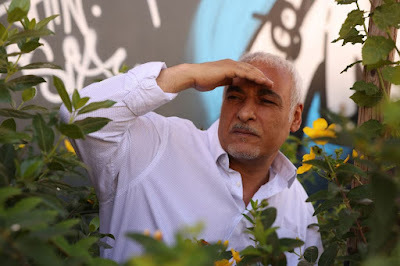
MuhsinAl-Ramli:
���������� ������������ The President���s Gardens
https://www.themodernnovel.org/asia/arab/iraq/muhsin-al-ramli/the-presidents-gardens/
This novel is essentially about three(male) Iraqi friends, all of about the same age and how they grew up andremained friends. There was Tariq, nicknamed the Befuddled because hewould always show childlike amazement upon encountering any new thing or idea.He was the son of Zahir, the imam of the mosque. He will later become a teacherand imam himself. Ibrahim was the strongest and the kindest. He was nicknamedThe Fated because he accepted every report and every accident with anastonishing equanimity. He was the son of Suhayl the Damascene who had nonose. Zahir and Suhayl had gone to fight for Palestine in the 1948 war. When anartillery shell exploded near them, Zahir wet himself. Suhayl later got a boilon his nose which got infected and, as it was not treated he lost his nose.They agreed not to tell what really happened and that Suhayl lost his nosebravely defending Damascus, hence his nickname.
The third one is Abdullah Kafka. Tariqgave him the nickname, after reading Kafka because Abdullah wastypically attuned to the blackest side of any idea or situation, and even whenhe laughed, a deep and firmly rooted sadness appeared in his eyes. Abdullahwas a foundling and had been adopted by the childless couple who found him,Salih and Maryam. We know that there are some people who know who hisbiological parents were but we and Abdullah only find out much later in thebook, and a very complex but sad tale it turns out to be. In the meantime, aswell as being called Kafka, he calls himself son of the earth crack asthat is where his adoptive father found him.
The three boys grow up together and areinseparable. When Ibrahim is fifteen, he does well at school but his fathermakes him leave school so he can work in the fields. Abdullah also drops out insympathy. Tariq continues at school but plays truant to be with his friends.
At eighteen Abdullah and Ibrahim arecalled up to do military service. Tariq is still studying so he is exempt. Hewill later be exempt as a teacher and imam. Ibrahim���s parents find a bride forhim while he is on military service. Abdullah and Sameetha, Tariq���s sister,fall in love but Tariq���s father rejects Abdullah. We know but Abdullah does notthat Tariq had told his father that Abdullah would not be a suitable husbandfor his sister.
National service is coming to an end forthe two young men but Iraq and Iran went to war with each other and the pairhad to continue to serve. It was a grim war and we are given all the gorydetails. Abdullah disappears and nobody knows if he is alive or a prisoner.Ibrahim does well, becoming a master sergeant but he sees many men killed andwounded, including some self-inflicted wounds to escape further service.
After the war Ibrahim goes back to thefields an will eventually learn that Abdullah is a prisoner in Iran. Ibrahim isnow married with a daughter, Qisma (= kismet, i.e. fate).Sadly, for him, he will have no further children. He does get a letter from theRed Cross, saying that Abdullah is a prisoner of the Iranians. (We had metAbdullah at a much later date at beginning of the book so we knew he hadsurvived.)
Ibrahim is just settling down when Iraqinvades Kuwait. Again he is conscripted. He serves in the desert near the Saudiborder, with his friend, Ahmad, whom he had met in the Iraq-Iran war. But, aswe know, the Gulf War happens and Ibrahim andAhmad and more destruction and death rain down on Iraq and our hapless heroes.Ibrahim,as we know from the beginning, survives, though he is wounded. Onceagain, we are spared none of the grisly details, as Iraq descends intochaos. They���re still bombing everything���military camps, bridges,communication stations and towers, power plants, water treatment facilities,government buildings, police stations, businesses, houses���everything, justeverything. To make matters worse, once the coalition troopswithdraw, the Republican Guard launches devastating raids against all thecities and villages that revolted. They���re bombing schools, houses, mosques,and mausoleums, killing without mercy. Ibrahim gets home and strugglesalong.
There are three mysteries in this book,I have mentioned the first, namely Abdullah���s origns, which are explained tohim at this point after his return from the horrors of being a prisoner in Iran(you know the drill ��� no details spared).
The second mystery occurs at the verybeginning of the book. Someone finds nine banana crates in the village. (Iraqdoes not grow bananas.) Each crate contains a severed head, with the ID of theowner of the head. The bodies are nowhere to be seen. One of the heads belongsto Ibrahim. What happened and why? We only learn why towards the end of thebook.
The third mystery concerns the title.For most of the book the president has, of course, been Saddam Hussein. Though he is very much a key player in this book, he is never mentionedby name. However, to this point his gardens have not been relevant. This isabout to change. Things are not going well for Ibrahim. His wife has cancer andhis daughter is being rebellious. Getting treatment for his wife is expensiveand difficult. With his connections, Tariq gets him a job in Baghdad. The jobinvolves tending the president���s gardens, which is a fairly easy and verywell-paid job. He gets treatment for his wife and Qisma can go to college andhe can even buy her a car.
Things are looking better but then, ashe has done so well, he is promoted. The new job involves better pay, shorterhours and a free taxi service to and from work. The job, however, is definitelynot as pleasant and easy (��� grisly details���). And then the US-led coalition invades.
More than once in recent times I havecommented on a book I have reviewed that it is grim but this one definitelycomes at or near the top on the grisly scale. The 1948 war, the Iran-Iraq War, the theGulf War, the interim period when Saddam sees enemieseverywhere, the Iraq War and the aftermath of thatwar all have their horrific stories to tell as seen through the eyes of ourheroes and al-Ramli spares us none of the details of the horrors.
However, what is interesting is seeingthese wars not from the perspective Westerners have seen them in the past,namely Iraq was all bad but seeing them from the perspective of the ordinaryIraqi. Our heroes do not like these wars any more than we do, Indeed, they likethem a lot less, as they get wounded and killed or their loved ones do andtheir lives are completely disrupted. Like most of us they just want to livetheir lives in peace. Al-Ramli moved to Madrid in 1995 and many other Iraqiswent into exile to escape both the wars and Saddam Hussein. You certainlycannot blame them. This book clearly shows why.
Publishing history
First published in 2012 by Thaq��fah lil-Nashr wa-al-Tawz����, Beirut
First published in English 2017 by MacLehose Press
Translated by Luke Leafgren
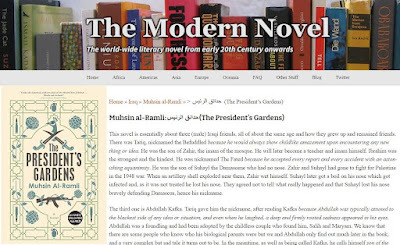
https://www.themodernnovel.org/asia/arab/iraq/muhsin-al-ramli/the-presidents-gardens/
The President’s Gardens... Modern Novel

Muhsin Al-Ramli:
حدائق الرئيس The President’s Gardens
https://www.themodernnovel.org/asia/arab/iraq/muhsin-al-ramli/the-presidents-gardens/
This novel is essentially about three (male) Iraqi friends, all of about the same age and how they grew up and remained friends. There was Tariq, nicknamed the Befuddled because he would always show childlike amazement upon encountering any new thing or idea. He was the son of Zahir, the imam of the mosque. He will later become a teacher and imam himself. Ibrahim was the strongest and the kindest. He was nicknamed The Fated because he accepted every report and every accident with an astonishing equanimity. He was the son of Suhayl the Damascene who had no nose. Zahir and Suhayl had gone to fight for Palestine in the 1948 war. When an artillery shell exploded near them, Zahir wet himself. Suhayl later got a boil on his nose which got infected and, as it was not treated he lost his nose. They agreed not to tell what really happened and that Suhayl lost his nose bravely defending Damascus, hence his nickname.
The third one is Abdullah Kafka. Tariq gave him the nickname, after reading Kafka because Abdullah was typically attuned to the blackest side of any idea or situation, and even when he laughed, a deep and firmly rooted sadness appeared in his eyes. Abdullah was a foundling and had been adopted by the childless couple who found him, Salih and Maryam. We know that there are some people who know who his biological parents were but we and Abdullah only find out much later in the book, and a very complex but sad tale it turns out to be. In the meantime, as well as being called Kafka, he calls himself son of the earth crack as that is where his adoptive father found him.
The three boys grow up together and are inseparable. When Ibrahim is fifteen, he does well at school but his father makes him leave school so he can work in the fields. Abdullah also drops out in sympathy. Tariq continues at school but plays truant to be with his friends.
At eighteen Abdullah and Ibrahim are called up to do military service. Tariq is still studying so he is exempt. He will later be exempt as a teacher and imam. Ibrahim’s parents find a bride for him while he is on military service. Abdullah and Sameetha, Tariq’s sister, fall in love but Tariq’s father rejects Abdullah. We know but Abdullah does not that Tariq had told his father that Abdullah would not be a suitable husband for his sister.
National service is coming to an end for the two young men but Iraq and Iran went to war with each other and the pair had to continue to serve. It was a grim war and we are given all the gory details. Abdullah disappears and nobody knows if he is alive or a prisoner. Ibrahim does well, becoming a master sergeant but he sees many men killed and wounded, including some self-inflicted wounds to escape further service.
After the war Ibrahim goes back to the fields an will eventually learn that Abdullah is a prisoner in Iran. Ibrahim is now married with a daughter, Qisma (= kismet, i.e. fate). Sadly, for him, he will have no further children. He does get a letter from the Red Cross, saying that Abdullah is a prisoner of the Iranians. (We had met Abdullah at a much later date at beginning of the book so we knew he had survived.)
Ibrahim is just settling down when Iraq invades Kuwait. Again he is conscripted. He serves in the desert near the Saudi border, with his friend, Ahmad, whom he had met in the Iraq-Iran war. But, as we know, the Gulf War happens and Ibrahim and Ahmad and more destruction and death rain down on Iraq and our hapless heroes. Ibrahim,as we know from the beginning, survives, though he is wounded. Once again, we are spared none of the grisly details, as Iraq descends into chaos. They’re still bombing everything—military camps, bridges, communication stations and towers, power plants, water treatment facilities, government buildings, police stations, businesses, houses—everything, just everything. To make matters worse, once the coalition troops withdraw, the Republican Guard launches devastating raids against all the cities and villages that revolted. They’re bombing schools, houses, mosques, and mausoleums, killing without mercy. Ibrahim gets home and struggles along.
There are three mysteries in this book, I have mentioned the first, namely Abdullah’s origns, which are explained to him at this point after his return from the horrors of being a prisoner in Iran (you know the drill – no details spared).
The second mystery occurs at the very beginning of the book. Someone finds nine banana crates in the village. (Iraq does not grow bananas.) Each crate contains a severed head, with the ID of the owner of the head. The bodies are nowhere to be seen. One of the heads belongs to Ibrahim. What happened and why? We only learn why towards the end of the book.
The third mystery concerns the title. For most of the book the president has, of course, been Saddam Hussein. Though he is very much a key player in this book, he is never mentioned by name. However, to this point his gardens have not been relevant. This is about to change. Things are not going well for Ibrahim. His wife has cancer and his daughter is being rebellious. Getting treatment for his wife is expensive and difficult. With his connections, Tariq gets him a job in Baghdad. The job involves tending the president’s gardens, which is a fairly easy and very well-paid job. He gets treatment for his wife and Qisma can go to college and he can even buy her a car.
Things are looking better but then, as he has done so well, he is promoted. The new job involves better pay, shorter hours and a free taxi service to and from work. The job, however, is definitely not as pleasant and easy (… grisly details…). And then the US-led coalition invades.
More than once in recent times I have commented on a book I have reviewed that it is grim but this one definitely comes at or near the top on the grisly scale. The 1948 war, the Iran-Iraq War, the the Gulf War, the interim period when Saddam sees enemies everywhere, the Iraq War and the aftermath of that war all have their horrific stories to tell as seen through the eyes of our heroes and al-Ramli spares us none of the details of the horrors.
However, what is interesting is seeing these wars not from the perspective Westerners have seen them in the past, namely Iraq was all bad but seeing them from the perspective of the ordinary Iraqi. Our heroes do not like these wars any more than we do, Indeed, they like them a lot less, as they get wounded and killed or their loved ones do and their lives are completely disrupted. Like most of us they just want to live their lives in peace. Al-Ramli moved to Madrid in 1995 and many other Iraqis went into exile to escape both the wars and Saddam Hussein. You certainly cannot blame them. This book clearly shows why.
Publishing history
First published in 2012 by Thaqāfah lil-Nashr wa-al-Tawzīʻ, Beirut
First published in English 2017 by MacLehose Press
Translated by Luke Leafgren

https://www.themodernnovel.org/asia/arab/iraq/muhsin-al-ramli/the-presidents-gardens/
July 5, 2021
Al-Ramli: Los jardines del presidente /Mustapha M-Lamin
Muhsin Al-Ramli: Los jardines del presidente
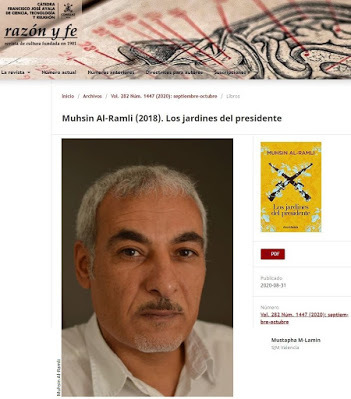
Por Mustapha M-Lamin
Al-Ramli, Muhsin: Los jardines del presidente.
Alianza, Madrid, 2018. 357 páginas.
Traducción de Nehad Bebars.
Comentario realizado por Mustapha M-Lamin (SJM Valencia).
En un país golpeado por el horror desde hace décadas, entre las agresiones externas que lo convirtieron en un polvorín crónico, y anteriormente las caprichosas aventuras belicistas de un megalómano con delirios de grandeza, no sorprende que en medio de tanta tragedia, terror y violencia pueda emerger con belleza una obra capaz de retratar todo lo vivido a largo de casi tres décadas por una sociedad sometida, primero, a los antojos de un tirano y, después, a la codicia de superpotencias incapaces de renunciar a la intervención en cada rincón del mundo con tal de mantener, en el ocaso de su trayectoria, un control absoluto del planeta.
A esta labor, la de narrar con inusitada hermosura la crueldad nauseabunda del ser humano, se puso el autor de la novela Los jardines del presidente, Muhsin Al-Ramli, para conseguir un retrato crítico, agudo y estremecedor de un país colapsado por la inestabilidad, violencia y las guerras fratricidas como principal herencia de la invasión de EE.UU. y sus aliados en el año 2003.
A lo largo de los dieciocho capítulos en los que se divide la novela, asistimos a la historia de tres amigos, Tarek, Abdulá e Ibrahim, nacidos en meses sucesivos del año 1959, a quienes el destino deparó diferente suerte. Nada más comenzar la novela, con una sobrecogedora imagen de cabezas decapitadas, estremece la carga de crueldad de los ajustes fratricidas, pues “En un país sin platanares, los habitantes del pueblo se despertaron con el hallazgo de nueve cajas para transportar plátanos. En cada una de ellas estaba depositada la cabeza degollada de uno de sus hijos y el documento que lo identificaba, ya que algunos rostros habían quedado totalmente desfigurados por la tortura anterior a su decapitación o por la posterior mutilación (…)” (p. 11). Una de esas cabezas era la de Ibrahim y la fecha del hallazgo, Ramadán del año 2006. La cabeza sin el resto del cuerpo simboliza el desgarro de una nación condenada a vivir en la violencia, con una hija obligada a emprender una búsqueda, tal vez inútil por el final abierto de la novela, para intentar reunir los restos mortales de su padre con la cabeza y darle digna sepultura a su progenitor, pues ante la disyuntiva de enterrar solamente la cabeza o aventurarse en una peligrosa investigación para hallar el resto del cuerpo, opta por la segunda y el narrador aprovecha para retroceder y repasar la historia de Irak.
Esta es una novela en la que confluyen muchos géneros. Bélica, o antibélica (a la altura de grandes novelas como Vida y destino, de Vasili Grossman; Los cuatro jinetes del apocalipsis, de Blasco Ibáñez; o la más reciente Morir en primavera, de Ralf Rothmann, con la que guarda varias similitudes (especialmente el reclutamiento de inocentes), por su retrato de las muchas guerras vividas por el país, desde las guerras contra la ocupación de Palestina, en las que participaron los padres de los tres protagonistas, pasando por la guerra contra Irán, en la que fueron obligados a participar Abdulá e Ibrahim, donde el primero cayó en un largo cautiverio en manos de los iraníes (p. 107) durante diecinueve años, y el segundo, víctima del efecto de los gases químicos, quedó estéril de por vida; la nefasta guerra del golfo de los años noventa del siglo pasado, a la que fue llamado a filas Ibrahim y en la que perdió una pierna después de la intervención de los aliados y ver que “la tierra vomitaba fuego, el cielo llovía fuego” (p. 74); hasta la guerra más reciente, convertida en enfermedad crónica, con la invasión de Estados Unidos en 2003.
También cabe en esta novela el género social, la crítica a algunos usos y costumbres como, por ejemplo, el triste asesinato de la madre de Abdulá, discapacitada que lo tuvo sin ser consciente de ello y fue apedreada hasta la muerte, mientras su violador no tuvo más castigo que una furibunda pero fugaz paliza paterna (p. 172); o la hipocresía clerical de los lenguaraces de los púlpitos, simbolizada en Tarek con la conquista de la jovencísima hija de su difunto amigo. Y para retratar el periodo especial sin guerra ni paz, con el país asfixiado por las sanciones de Estados Unidos a través de la ONU, emerge otro género como aquel que fue capaz de alumbrar la literatura hispanoamericana con novelas como La fiesta del chivo, de Vargas Llosa; Yo, el supremo, de Roa Bastos; Señor Presidente, de M. Ángel Asturias; o El recurso del método, de Alejo Carpentier: las novelas de dictador. Un simple paseo por los jardines del presidente (plagados de cadáveres de inocentes) permite apreciar con exactitud el grado de pomposa ostentosidad en el que viven él, su familia y colaboradores mientras el pueblo apenas puede respirar (p. 223) sumergido en la más absoluta miseria.
Después de la lectura de esta novela, que se cierra de manera circular con final abierto, conviene no perder de vista la producción futura de este autor, pues queda claro que está llamado a ocupar un lugar significativo no solo en la historia de la literatura árabe sino también en la universal. Quizás sea un juicio precipitado, pero el paso del tiempo permitirá saber si mis intuiciones son o no ciertas, por ahora esta voz promete consolidar un modo de narrar, con valentía para no omitir ni un solo tema, capaz de estremecer con sus descripciones, perturbar con sus descripciones y esperanzar con sus reflexiones, como la que emana del personaje de Abdulá en una escena de la novela: “No entiendo por qué a algunos no les bastan las ideas que ocupan su mente, sino que, además, se empeñan en poseer las mentes de los demás” (p. 142). Tarea nuestra será, por tanto, no permitir que posean las nuestras, especialmente en estos tiempos del barullo cibernético y los debates estériles acerca de nuestro tiempo.
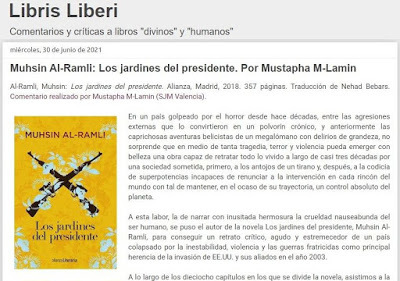
https://elblogdejaviersanchez.blogspot.com/2021/06/muhsin-al-ramli-los-jardines-del.html?spref=tw
https://revistas.comillas.edu/index.php/razonyfe/article/view/13731
Muhsin Al-Ramli's Blog
- Muhsin Al-Ramli's profile
- 82 followers



